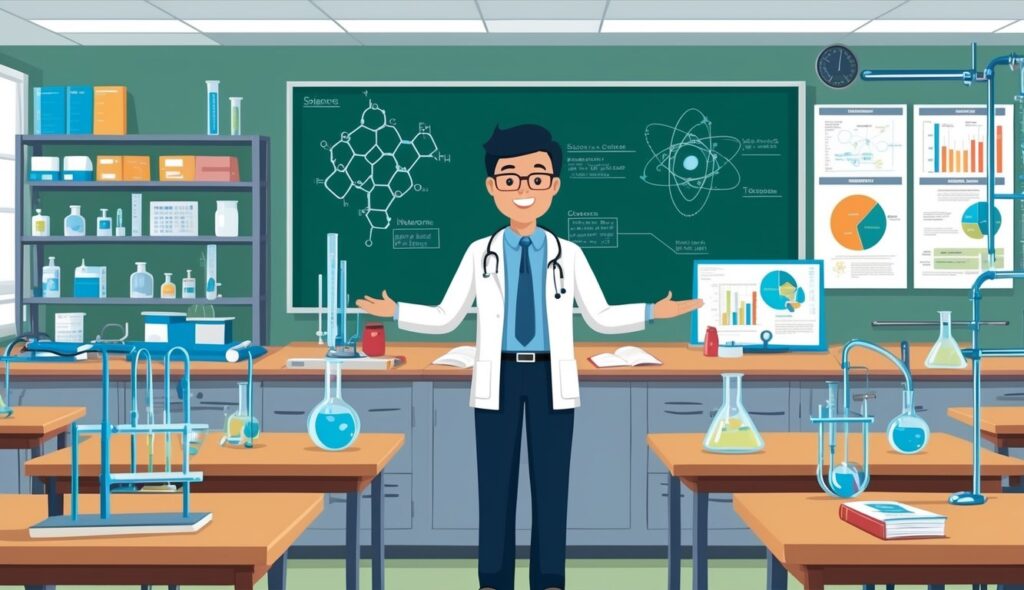100+ Science Teacher Interview Questions: Essential Insights for Success

Preparing for a science teacher interview can be bit technical, but you’re not alone. With the right questions in mind, you can walk into the interview room ready to impress.
This guide covers: 100+ Science Teacher Interview Questions that will help you feel more confident and prepared.
Whether you’re new to teaching or looking to move to a new school, having an idea of what to expect can make a big difference.
These questions cover everything from your teaching philosophy to how you handle lab safety and student engagement.
Reading through these questions will help you discover areas where you might want to focus your preparation. Dive in to find questions that will highlight your strengths and showcase your ability in the world of science.
Understanding the Role of a Science Teacher

As a science teacher, you are responsible for sparking curiosity and fostering a love for discovery in your students. Your role involves creating an engaging and inclusive learning environment where students feel encouraged to explore scientific concepts.
Teaching Science Fundamentals
In teaching science fundamentals, it’s essential to focus on core concepts that build a solid foundation in scientific knowledge. You should cover basics such as the scientific method, understanding hypotheses, and conducting experiments. These topics help students develop critical thinking skills.

An inclusive education is important, allowing all students, regardless of background or ability, to participate. Incorporating diverse teaching methods, such as hands-on activities, visual aids, and discussions, ensures that students with different learning preferences can succeed in science education.
List of 100 Science Teacher Interview Questions

- How do you handle classroom disruptions?
You should address disruptions calmly and use clear expectations. Implement classroom management strategies effectively. - How do you differentiate instruction for diverse learners?
You can use varied teaching styles and materials. Incorporating visual, auditory, and kinesthetic activities can help. - Explain how you use technology in your teaching.
Use tools like interactive simulations to demonstrate complex concepts, or apps that engage students creatively. - How do you assess student understanding?
Use a mix of formative and summative assessments, quizzes, and projects to evaluate their grasp of the material. - Describe a successful science project you’ve conducted.
Discuss a project that engaged students in inquiry-based learning and led to tangible outcomes or discoveries. - How do you keep students motivated in science?
Connect science to real-world examples. Encourage curiosity with experiments and relate topics to students’ interests. - Discuss a time you adapted a lesson on short notice.
Highlight flexibility, using available resources, and focusing on core objectives to adapt efficiently. - What strategies do you use for students who struggle?
Offer additional support through one-on-one sessions and tailored resources to address their needs. - How do you ensure safety during experiments?
Set clear safety guidelines, demonstrate practices, and supervise students closely during experiments. - How do you teach complex scientific concepts?
Breakdown concepts into simple steps using analogies and models to make them easier to understand. - Describe your experience with interdisciplinary teaching.
Collaborate with teachers in other subjects to design integrated lessons that provide broader perspectives. - What do you consider your greatest teaching strength?
Your ability to create an engaging classroom environment that fosters critical thinking. - How do you stay updated with science advancements?
Regularly read scientific journals, attend workshops, and engage in professional learning communities. - What role does inquiry play in your teaching?
Encourage students to ask questions, conduct experiments, and explore results independently. - How do you address different learning paces?
Offer extension activities for advanced learners and step-by-step guides for those who need more time. - How do you incorporate feedback from students?
Use student feedback to refine lessons, ensuring they are engaging and educational. - How do you handle a lack of engagement with a topic?
Use interactive activities and connect the topic to students’ everyday lives and interests. - What techniques do you use for classroom discussions?
Employ open-ended questions and encourage respectful debate to foster a lively discussion environment. - How do you incorporate lab work in your teaching?
Use labs to reinforce theoretical knowledge with practical application for better understanding. - How do you handle a diverse classroom?
Foster an inclusive environment where all students feel valued and respected. Use culturally responsive teaching methods. - What motivates you to teach science?
- Describe your approach to lesson planning.
- How do you integrate environmental science into your curriculum?
- How do you evaluate your teaching effectiveness?
- Discuss a scientific breakthrough you find captivating.
- How do you inspire a love of learning?
- Describe a challenge you faced in the classroom.
- How do you approach teaching controversial topics?
- Explain your grading philosophy.
- Describe your experience with digital learning platforms.
- How do you promote scientific literacy?
- What makes a good science teacher?
- Describe a collaborative project you’ve led.
- How do you address equity in science education?
- What is your experience with science fairs?
- How do you prepare students for standardized tests?
- What do you do if a lesson doesn’t go as planned?
- How do you handle criticism from students?
- How do you maintain professionalism in the classroom?
- What strategies do you use for English language learners in science?
- How do you foster inquiry and curiosity?
- How do you introduce new vocabulary?
- Describe your classroom management style.
- How do you develop critical thinking skills?
- How do you incorporate hands-on activities?
- How do you communicate with parents about science activities?
- How do you build relationships with students?
- Describe your approach to project-based learning.
- How do you advocate for science in your school?
- What is your favorite science topic to teach, and why?
- How do you encourage collaboration among students?
- How do you use formative assessment in your teaching?
- How do you incorporate current science events?
- What is your philosophy on homework?
- How do you balance structure and flexibility in class?
- How do you integrate STEM into your lessons?
- How do you foster creativity in science?
- How do you address misconceptions in science?
- What role does ethics play in science education?
- How do you identify gifted students in science?
- How do you use data to improve teaching?
- Describe a time you used storytelling in science.
- How do you adapt plans for different grade levels?
- How do you incorporate field trips into your curriculum?
- What is your experience with science competitions?
- How do you integrate art into science teaching?
- How do you create a culturally responsive science classroom?
- How do you manage classroom resources?
- Describe your use of scientific models in class.
- How do you teach about sustainability?
- Describe a successful science partnership you’ve had.
- How do you use peer feedback in science activities?
- How do you teach scientific argumentation?
- How do you keep yourself motivated as a teacher?
- What is your approach to continuous professional development?
- How do you teach about climate change?
- How do you incorporate non-traditional teaching methods?
- How do you ensure your lessons are inclusive?
- What is your experience with grant writing for science education?
- Describe your approach to teaching about the scientific method.
- How do you teach data analysis in science?
- How do you support students who lack confidence in science?
- How do you blend theory and practice in your teaching?
- How do you prepare for a new school year?
- How do you involve students in classroom decision-making?
- How do you handle a large class size?
- How do you incorporate history of science lessons?
- What strategies do you use for teaching physics?
- How do you foster digital literacy?
- How do you create interactive lessons?
- How do you incorporate mindfulness in your teaching?
- Describe a time you had to learn a new skill for teaching.
- How do you prioritize your teaching responsibilities?
- How do you incorporate student voice in lessons?
- How do you approach teaching biology?
- How do you handle repeated questions from students?
- How do you teach about ethics in technology?
- How do you approach teaching chemistry?
- How do you adapt to different teaching environments?
- How do you plan to grow as a science teacher?
Teaching Philosophy and Methods

Every teacher needs a strong teaching philosophy and effective methods to engage students and encourage learning. A well-crafted approach can help you connect with students, harness technology, and create innovative lesson plans.
Developing a Teaching Style
Your teaching style is important. It’s how you connect with students. Think about what works best for you. Some teachers are more interactive, while others focus on lectures.
Reflect on past experiences to find what fits you. Consider feedback from students. This can guide you to improve.
Implementing Teaching Strategies
Using varied teaching strategies keeps students interested. Mix group work, hands-on activities, and lectures. Adjust these strategies based on the topic or student needs.
Active learning activities can increase engagement. Incorporating discussions, problem-solving tasks, or experiments keeps the class dynamic.

Incorporating Educational Technology
Educational technology can enhance learning. Use tools like smartboards, tablets, or online resources to make science more interactive.
Platforms like Google Classroom or Zoom can manage lessons and foster collaboration. These resources can help visualize complex concepts and allow students to explore topics further. Online quizzes and simulations also provide instant feedback, helping students know their progress.
Constructing Effective Lesson Plans
Lesson plans guide your teaching. Start by setting clear objectives. Know what you want students to learn by the end.
Incorporate various activities. Use a mix of lectures, videos, and discussions. This keeps students engaged. Also, consider student backgrounds and adjust topics to better suit their understanding.
Enhancing the Science Curriculum
Improving the science curriculum involves staying updated with the latest developments. Regularly integrate new discoveries into lessons. This shows students the relevance of what they’re learning.
Invite guest speakers or organize field trips to connect classroom knowledge to real-world situations. Keep evaluating and adjusting the curriculum to meet educational standards and students’ interests.
Frequently Asked Questions
Science teaching involves staying updated with new methods, creating engaging lesson plans, and using technology effectively. Assessing and supporting struggling students is also crucial.
How do you stay updated with the latest developments in science education?
You can stay informed by attending workshops, reading scientific journals, and joining professional networks. Regularly participating in online forums and webinars can also help keep you abreast of the latest trends and discoveries in science education.
Can you provide an example of an innovative lesson plan you have created for a science class?
A project-based lesson on renewable energy could be exciting. Students can design simple models of solar panels or wind turbines.
By building these models, students learn about energy conversion and the practical uses of renewable sources. This hands-on approach makes learning active and engaging.
What strategies do you use to engage students who may be struggling with the subject matter?
Breaking complex topics into simpler parts is helpful. Use visual aids and real-life examples to clarify concepts. Encourage group discussions and peer tutoring, which can create a supportive learning environment.
Offering extra help sessions outside of regular class time can also make a difference.
How do you assess student understanding and knowledge in science?
Utilize both formative and summative assessments. Quizzes, tests, and hands-on experiments can all gauge learning.
Regularly integrating projects and presentations allows students to demonstrate their understanding practically. Informal assessments like class discussions can also give insights into their grasp of the material.
What is your approach to integrating technology into your science lessons?
Using technology like simulations and interactive websites can make lessons more engaging. Educational apps can provide interactive learning experiences that deepen understanding.
Smartboards and projectors can help bring visual and complex concepts to life, enhancing overall student engagement.
All the Best !






